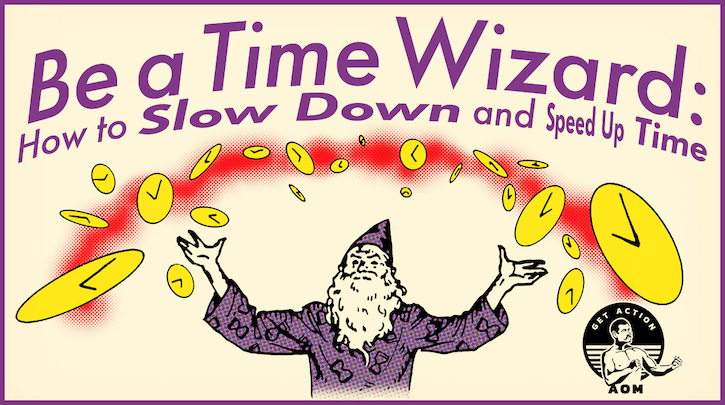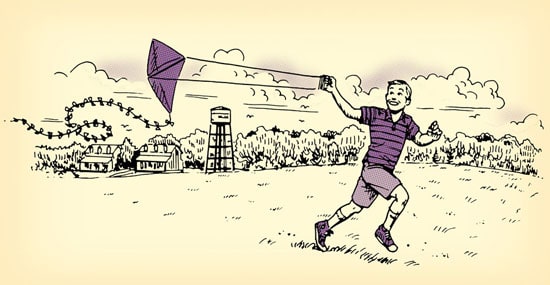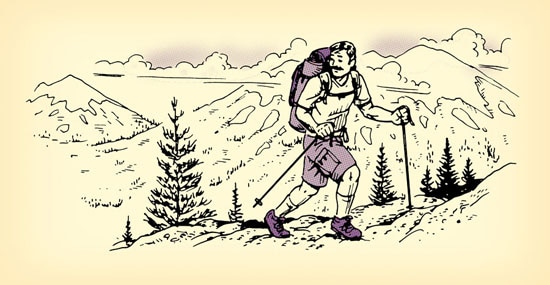
With our archives now 3,500+ articles deep, we’ve decided to republish a classic piece each Sunday to help our newer readers discover some of the best, evergreen gems from the past. This article was originally published in August 2014.
As we now approach the sunset of the summer season, take a look back on the last few months. Does it seem like your summer lasted forever, that it slowly floated along in a hot haze? Or did these last few months seem to go by in a blink?
Your answer to that question will likely depend on your age. If you’re a young buck, you’ll probably feel like you fit six months into the last three. If you’re longer in the tooth, chances are your summer seems to have gone by in a quick blur – much like the rest of your year.
Why does time seem to slow down when you’re young, and speed up as you get older? You may have heard it said that this phenomenon can be chalked up to the fact that when you’re younger, each year comprises a larger percentage of your total lifespan and thus feels more sizeable; one year is 1/14 of your life when you’re fourteen, but only 1/40 when you’re 40.
That’s a fun theory, but there’s an actual neurological reason for how our perception of time changes as we age. And once you understand it, you can become something of a time wizard — quickening or slowing the way time feels, and even making your life seem longer than it really is.
Living on Brain Time
Time is a fixed dimension. “Clock time” can be broken into minutes, seconds, and nanoseconds, and can be objectively measured. Even without an external chronometer to aid us, our internal clocks often do an excellent job of tracking time; if I asked you to guess the time right now, you’d probably be pretty close.
Yet how we perceive time is not always so accurate. Depending on our circumstances, time may seem to contract or expand, speed up or slow down. Dr. David Eagleman, neuroscientist and foremost researcher on time perception, calls this phenomenon “brain time,” and unlike clock time, its measurements are very subjective.
In contrast to our other senses like touch and taste, which are located in specific parts of our brains, our sense of time is woven throughout our neural matter. As Eagleman puts it, time is “metasensory” and “rides on top of all the others.” Because our perception of time is intricately tied up with our emotions and memories, the information we take in about how our hours are spent isn’t raw data. Instead, Eagleman explains, our minds filter the info before presenting it to us:
the brain goes through a lot of trouble to edit and present this story to you of what’s going on out there and how fast or slowly it happens. What your brain’s telling you [that] you see is not always what’s out there. It’s trying to put together the best, most useful story of what’s happening out there in the world.
Time then, Eagleman argues, is ultimately “a construction of the brain.”
Does “Matrix” Time Exist?
To understand when, how, and why your brain edits your perception of time, it’s useful to begin with what happens to your “brain time” when faced with a life-threatening situation. If you’ve ever felt close to death – gotten into a car wreck, engaged in a firefight, fell off a roof – you likely felt that time expanded during those fraught moments, and that everything happened in slow motion, à la The Matrix. In the aftermath, you probably remembered the experience in vivid detail.
Dr. Eagleman wanted to find out if people’s brains were really slowing down their perception of the world during these life-threatening situations, or if something else was going on. So he took a group of participants to one of the scariest “amusement” rides in the world: the SCAD. Riders are dropped, on their backs, into a 100-foot freefall. Those who try it typically find the experience utterly terrifying. Eagleman had his participants wear a wristwatch and asked them to look at it during their freefall. The watch would flash a digital read-out of a number a split-second too fast for the human eye to register under normal conditions. If fear slows down our perception of reality, Eagleman reasoned, the participants would be able to see the number as they dropped. Yet none were able to do so.
After their experience on the SCAD, Eagleman asked the participants to imagine their fall and how long it had taken. Though they had been able to accurately guess the time of others’ falls, when it came to estimating their own drop, they invariably felt it had taken 30% longer than it actually had.
From these results, Eagleman posited that time doesn’t actually slow down when we’re fearing for our lives. Instead, scary situations send our amygdala – a part of the brain connected with memory and emotion – into overdrive, spurring the brain to record much more detail than normal. Because the brain lays down such rich, dense memories of those moments, when you later look back on the experience, there’s a lot more “footage” than normal to run through, making the experience seem like it lasted longer than it actually did.
Novelty and Our Sense of Time
Time will not only seem to expand during life-threatening situations, but also whenever we encounter something novel or do something new.
In another experiment, Eagleman had participants sit in front of a computer screen that continuously flashed the same image of a shoe. Every once in awhile, the monotony was broken with a picture of a flower. The participants believed that the flower stayed on the screen longer, when in fact it cycled through just as quickly as the shoes.
It may be that the flower seemed to linger because its novelty spurred the participants to pay greater attention to it (more attention=more memory laid down=perception of longer duration). But it’s equally possible that the flower seemed to stay longer because the pictures of the shoes became compressed. Through a cognitive phenomenon called “repetition suppression,” once the brain has been exposed repeatedly to the same stimuli, it doesn’t have to expend as much time and energy recognizing it. The first time the brain encounters something, it utilizes a high amount of cognitive resources in order to make sense of it. The novelty of the stimulus spurs the mind to capture a lot of detail, which makes the encounter seem longer. With each exposure to the same stimuli, the energy required to identify it goes down, as does how long your encounter with it seems to last; the brain develops little neural shortcuts, allowing it to recognize the stimulus much more efficiently. Thus for the participants in the study, the shoe images would have appeared to stay on the screen for a shorter duration than they actually did, making the flash of an occasional flower seem longer in contrast.
“Repetition suppression” is also in effect when we encounter predictable patterns. The brain knows what’s coming and doesn’t have to work very hard to prepare for what’s around the bend. For example, when you see “1, 2, 3, 4…” your brain’s energy expenditure rises on #1, and then greatly falls off once it recognizes the familiar pattern.
But Doesn’t Time Fly When You’re Having Fun?
What may be puzzling about Eagleman’s research is that it seems to contradict popular maxims like “Time flies when you’re having fun,” and “The watched pot never boils.” Don’t exciting and novel experiences speed up time rather than slow it down?
I posed this question to Dr. Eagleman, who explained to me that there are two types of time perception: prospective and retrospective. Prospective time occurs when you’re in the moment, and your brain is anticipating what will happen next. When you’re busy and a lot is happening, “your mind is no longer attending to time at that moment — you’re not checking your watch or clock — so it seems like time is going by fast.” If you’ve ever been a waiter on a busy night, you know your shift can fly by — your mind is super focused on serving customers and what your next task is rather than on the clock.
The flip side of prospective time occurs in situations that lack stimuli to engage your brain. If you’re in a boring meeting, or on a long flight, “your mind is deeply attuned to time because you’re always checking your watch every 10 minutes or so.” You have little else to do besides watch the minutes tick by, which makes time seem to slow way down.
Once your mind reflects on what you’ve been doing (which happens pretty immediately), you transition into retrospective time. If you’ve been doing something boring and bereft of stimuli, your brain won’t have recorded much “footage” from the experience, and it will seem like a quick episode – a waft of cerebral nothingness – in your memory. If you look back on that boring meeting or long flight, it barely registers as a happening in your brain.
But when you reflect on a dangerous or novel experience, your mind’s got plenty of detailed footage for you to peruse. Your brain interprets this fact thusly: “That must have taken a long time because I don’t normally retain that much detail about events.”
Hence, time does fly when you’re having fun, but then stretches out in your memory.
How to Become a Time Wizard and Slow or Quicken Your Perception of Time
As you’ve been reading along, you’ve probably already been thinking about how this research applies to your own life, and at last you know the answer to the question we posed at the start: why does time seem to slow down when you’re young, and speed up as you get older?

When you’re young, everything is new – you’re constantly figuring out how the world works and learning the rules that govern nature and society. And you’re regularly engaging in “firsts”: first day of school, first time driving, first real job, and so on. With all this novelty, your brain is regularly laying down the kind of rich, dense memories that stretch out your perception of time.
In contrast, when you’re an adult, you’ve pretty much been there and done that. You’ve discovered the patterns of life, and your day-to-day doings are likely much more routine and predictable. Your brain doesn’t have any reason to expend energy on capturing your repetitious and predictable morning commute, ceremonial eating of a ham sandwich at your desk at work, and nightly watching of Game of Thrones. “Nothing to see here,” your brain says, and its camera clicks off. Thus, when you look back on each week, month, and year, there’s very little footage to read out, and your life seems to have passed in a fleeting blur.

Those who live a mundane, repetitious life are actually hit with a double whammy: in the midst of their boring day-to-day lives (prospective time), time seems to drag interminably on. Yet when they reflect on their lives (retrospective time), it seems to have sped by!
Yet such a fate is not inevitable. The very cool thing about this research is that it shows us how easily time can be manipulated – how “rubbery” it is, as Eagleman puts it. You have it in your power to slow down (or speed up) your perception of time. You can’t literally make your life longer, but you can make it seem longer. All you need to do is regularly inject a little novelty into it. Think about the last time you went on a great, action-packed vacation. Dimes to donuts, at the end of the trip, you said something like, “We were only here a week, but I feel like we’ve been gone forever.” All that new adventure slowed down your perception of time. Even as we get older, we can still seek out new horizons and new “firsts.”

You don’t have to do big things like traveling in order to stretch out time either. Eagleman says that even very small changes that “shake up your neural circuits” will do the trick. He recommends trying things like:
- Switching the wrist you put your watch on
- Changing around the arrangement of your furniture at home
- Driving a different way to work
Once you start looking for them, you can find tons of ways to mix things up and re-capture your youthful curiosity and penchant for exploration.
When you reach the end of your days, and look back over the course of your life, you can either feel like you were just 18 yesterday and that the subsequent decades passed in the blink of an eye; or, you can run the tape on a seemingly never-ending stream of rich footage of your many adventures, your interesting everyday life, and the wealth of knowledge you accumulated. If the latter, instead of seeing your life flash before your eyes, you will enjoy the satisfaction of watching it languidly unfold and relish the sense of having fit several lifetimes into a single one.
Illustrations by Ted Slampyak


